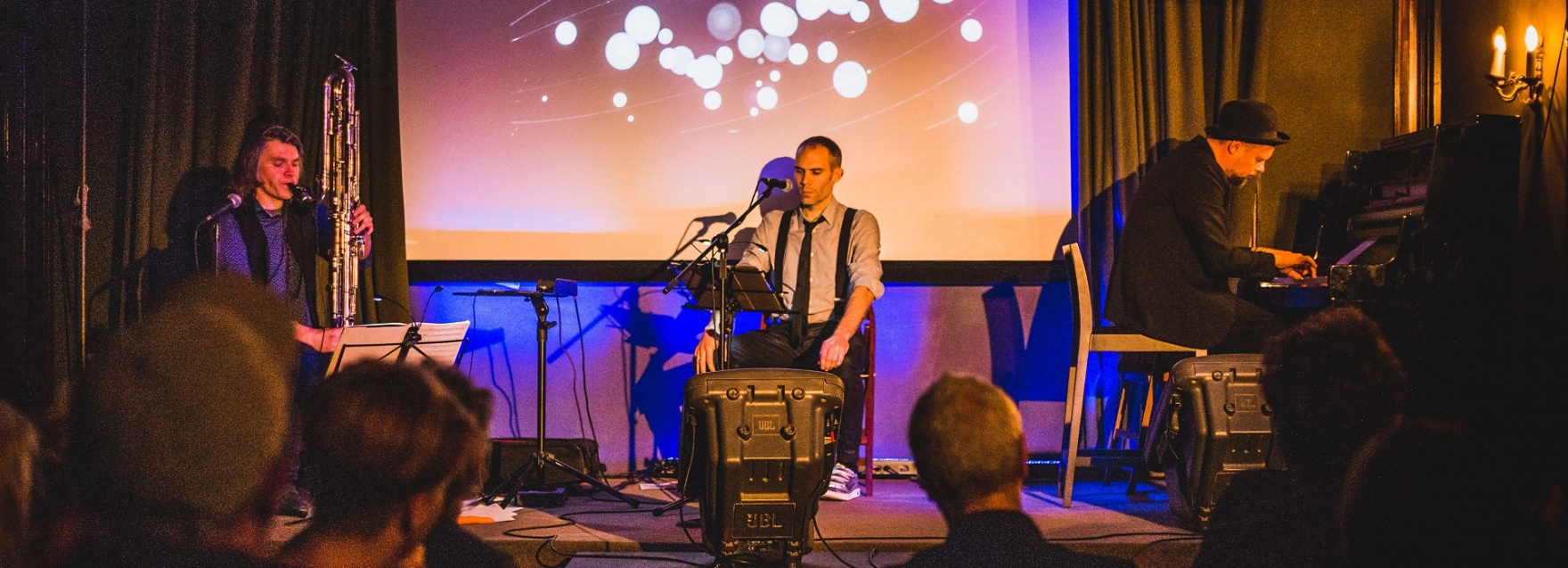 Michał Górczyński z lewej, fot. Daniel Hawryluk
Michał Górczyński z lewej, fot. Daniel Hawryluk
 DOŚWIADCZANIE PIEŚNI
DOŚWIADCZANIE PIEŚNI
PIOTR SZWED
William Blake najpierw w latach 50. został bohaterem beatników, rozpropagowanym przede wszystkim przez Allena Ginsberga. W kolejnej dekadzie przeniknął do zbiorowej wyobraźni dzięki obecności w tekstach ikon piosenki tamtych czasów – Boba Dylana i Jima Morrisona. To uruchomiło prawdziwą lawinę inspiracji, niedawno podsumowaną wystawą „William Blake and the Age of Aquarius” zorganizowaną w amerykańskim Block Museum of Art. Pokazywała ona ledwie wycinek tego, jak autor „Pieśni doświadczenia” wpłynął na XX-wiecznych i XXI-wiecznych muzyków. Jego popularność przetrwała bowiem wśród nich zmierzch hipisowskiej Ery Wodnika. Po nagraniach psychodelicznych The Fugs przyszedł czas na Williama Blake’a w wersji tak różnorodnych artystów jak m.in. Loretta McKennitt, Bruce Dickinson, U2, Coil, John Zorn czy Cherry Poppin’ Daddies.
Zainteresowanie muzyków klasykiem brytyjskiej poezji ma z pewnością wiele źródeł, choćby fascynujący w jego dziele splot różnych dziedzin sztuki – malarstwa, literatury i muzyki. Być może najważniejszym z nich jest właśnie niezwykła, wymykająca się nawet najlepszym przekładom, muzyczność jego poezji.
Zasłuchany w nią jest z pewnością Michał Górczyński – klarnecista, wcześniej związany z takimi zespołami jak m.in. Pole, Ircha i Kwartludium, autor wydanej na początku października płyty „William’s Things”. Album poświęcony Blake’owi to kontynuacja projektu „Muzyka do języków”. Od 2013 roku Górczyński, współpracując z wieloma postaciami sceny nie tylko jazzowej, ponawia próby dźwiękowego odzwierciedlania poezji. Zaczęło się od płyty „Preparing To Dance”, której tematem były pisane w jidisz teksty Yermiyahu Ahrona Tauba. Następnie w 2015 roku wraz z krążkiem „Utsuroi” przyszła kolej na lirykę japońską (Yashihiro Harady i Kawahigashiego Hekigoto), a rok później dźwiękową interpretację perskich mistycznych wierszy Dżalaluddina Rumiego (album „Zin do hezaran…”). Przed paroma miesiącami ukazało się „Bidadari” powstałe we współpracy z Warszawską Grupą Gamelanową, skupione na indonezyjskich utworach Sahnila Arifa Farabionsaha.
Dotychczasowe nagrania projektu Górczyńskiego, choć stylistycznie i tematycznie różnorodne, łączy szczególna relacja słowo–dźwięk, o której artysta opowiedział w wywiadzie dla serwisu PopUpMusic. Wspomniał tam, że „język generuje trzy poziomy inspiracji”. Pierwszym są obrazy poetyckie, drugim rytm i melodia słów, które pozwalają przekładać język na konstrukcję utworu, trzecim – intuicje i skojarzenia związane z określoną kulturą. Górczyński, który muzycznie lubi nie tylko podróżować w przestrzeni, ale i w czasie (rok temu współtworzył na albumie „Bastarda” chwaloną interpretację średniowiecznej muzyki Piotra z Grudziądza), w swoich kompozycjach często przyjmuje postawę kreatywnego tłumacza, kogoś, kto poszukuje nowych doświadczeń po to, by przełożyć je na własny, muzyczny język – łącząc inwencję z równie istotną precyzją.
Na „William’s Things” bardzo dobrze słychać wyczucie towarzyszące wsłuchiwaniu się w teksty Williama Blake’a. O wierszu „The Little Boy Lost” często pisano, podkreślając jego bardzo prosty, regularny rytm, zaakcentowany wyraźną średniówką:
The night was dark, no father was there;
The child was wet with dew;
The mire was deep, & the child did weep,
And away the vapour flew.
Górczyński odnajduje dla takiej poetyki odpowiednią muzyczną formę – jedynie cztery dźwięki, które mogą się kojarzyć z wprawką dziecka rozpoczynającego swoją przygodę z instrumentem muzycznym. Klarnecista do końca zachowuje tę minimalistyczną strukturę. Operuje dynamiką, zmieniając niepokój w rozpacz, tworząc przejmujący utwór o dziecięcej bezradności, tęsknocie i bezsilnym gniewie zamkniętym w obrębie powtarzanych rozpaczliwie gestów.
Podobne zależności widać choćby w „Spring” – niezwykle zmysłowej próbie oddania rodzącej się harmonii wyrażonej poprzez współbrzmienie słów:
Sound the flute!
Now it’s mute.
Birds delight
Day and night;
Nightingale
In the dale,
Lark in sky,
Merrily,
Merrily, merrily, to welcome in the year.
Jak zagrać na klarnecie parzysty układ rymów i wersy składające się z dwóch, trzech wyrazów? Rozwiązaniem okazuje się kilkusekundowy loop, na którego tle pianino Tomasza Wirackiego szkicuje dźwięki kojarzące się z niektórymi delikatniejszymi nagraniami producenta minimal techno Murcofa. Splot ambientu, minimalistycznego jazzu i poezji to rozwiązanie pozwalające wydobyć z słów ich wieloznaczność. W „Spring” Blake opisuje stopniowe rozkwitanie świata, a Górczyński z Wirackim zapewniają odpowiednie warunki do niespiesznego dojrzewania sensów.
Płytę taką jak „William’s Things” – opartą na wyrazistym brzmieniu klarnetu kontrabasowego – łatwo można skazać na niszowość. Jest to o tyle niesprawiedliwe, że jazzowe czy elektroniczne motywy współistnieją tu z naprawdę doskonałymi, różnorodnymi piosenkami. Ich atutem są melodie zaśpiewane przez Seana Palmera. Wokalista, znany widzom Teatru Wielkiego i Teatru Dramatycznego w Warszawie ze spektaklów takich jak „Oresteia” Michała Zadary czy „Śmierć i dziewczyna. Dramaty księżniczek Elfriede Jelinek” Agnieszki Korytkowskiej-Mazur, pokazuje imponujące aktorskie możliwości. W „My Pretty Rose-Tree” jego interpretacja przywodzi na myśl wczesne nagrania Antony and The Johnsons, a w „The Blossom” na granicy karykaturalności, ale jednocześnie naprawdę dobrze wchodzi w rolę Toma Waitsa.
.
.
Zdarza się, że Palmer brzmi jak wściekły Marc Almond („The Little Boy Lost”), by w finałowym „The Clod and the Pebble” pójść tropem późnego, wyciszonego Nicka Cave’a. Początkowo trudno uwierzyć, że Górczyński współpracuje na tej płycie z tylko jednym, cały czas tym samym wokalistą. Oczywiście można zarzucić mu manieryczność, ale nawet ona nie przeszkadza, stając się środkiem wyrazu niezwykłego monodramu – pozwalającego zaistnieć na płycie wielu postaciom, emocjom, perspektywom.
Każdy wybór poezji jest jakąś jej interpretacją. Górczyński przemieszał ze sobą utwory pochodzące z „Pieśni niewinności” i „Pieśni doświadczenia”. Na płycie dominuje jednak (i to zdecydowanie) nastrój tego drugiego, późniejszego i bardziej pesymistycznego tomu Blake’a. Mniej na tej płycie mistyki – a więcej namacalnych doświadczeń, zmysłowości i grozy przemijania. Dlatego właśnie doskonałym pomysłem jest zakończenie tego minizbioru poezji Williama Blake’a utworem o grudce ziemi i kamyku.
Zawartość publikowanych artykułów i materiałów nie reprezentuje poglądów ani opinii Reunion’68,
ani też webmastera Blogu Reunion’68, chyba ze jest to wyraźnie zaznaczone.
Twoje uwagi, linki, własne artykuły lub wiadomości prześlij na adres:
webmaster@reunion68.com





